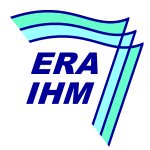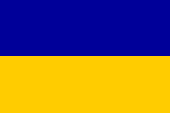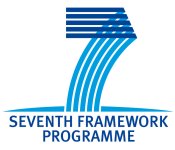|
|
 On January 24-25, 2012 the trainings on learning of young Ukrainian
researchers to modern techniques of retrospective prognosis - backcasting
were organized in Kyiv on the base of the Institute of Hydromechanics of
Ukraine. Besides the people from IHM, the students, postgraduates and
lecturers from the National Technical University of Ukraine "KPI" and the
National University of Water Management and Nature Resources (Rivne, Ukraine).
On January 24-25, 2012 the trainings on learning of young Ukrainian
researchers to modern techniques of retrospective prognosis - backcasting
were organized in Kyiv on the base of the Institute of Hydromechanics of
Ukraine. Besides the people from IHM, the students, postgraduates and
lecturers from the National Technical University of Ukraine "KPI" and the
National University of Water Management and Nature Resources (Rivne, Ukraine).
 Unlike the traditional forecasting originating from the modern state of
affairs and basing on
extrapolation of already existing trends, at backcasting, a future with
certain desirable characteristics (vision) is modelled. Then, the
development scenario is created "top-down" step by step - from future
to now. Such approach allows avoiding of uncertainties peculiar to the
long-term forecasting that occur due to unpredictable character of
technology development and changes of other socially significant
parameters. Briefly, the idea of backcasting might be expressed, as follows:
"the future cannot be forecasted, still it may be constructed".
To say, in some sense the backcasting is an analogy of the inverse
problems from the mathematical physics. Evidently, it should suffer from
the similar difficulties related with scenario non-uniqueness,
incomplete data and, sometimes, with inconsistency of the given vision.
Unlike the traditional forecasting originating from the modern state of
affairs and basing on
extrapolation of already existing trends, at backcasting, a future with
certain desirable characteristics (vision) is modelled. Then, the
development scenario is created "top-down" step by step - from future
to now. Such approach allows avoiding of uncertainties peculiar to the
long-term forecasting that occur due to unpredictable character of
technology development and changes of other socially significant
parameters. Briefly, the idea of backcasting might be expressed, as follows:
"the future cannot be forecasted, still it may be constructed".
To say, in some sense the backcasting is an analogy of the inverse
problems from the mathematical physics. Evidently, it should suffer from
the similar difficulties related with scenario non-uniqueness,
incomplete data and, sometimes, with inconsistency of the given vision.
 Dr. Jaco Quist (TU Delft, the Netherlands) has
presented an extended lecture "Backasting and Sustainable Development",
that introduced the audience with the fundamentals of such
retrospective prognosing. The practical examples of application of
backcasting were shown. One of the most important issues put forward in
the lecture was that such planning cannot base on the only abstract
estimations of the experts. For valid realisation of the scenarios for
Sustainable Development, the involving of different stakeholders from
society is necessary at each stage, starting from formulation of vision
and finishing with implementation of certain stages, scenario correction,
etc.
Dr. Jaco Quist (TU Delft, the Netherlands) has
presented an extended lecture "Backasting and Sustainable Development",
that introduced the audience with the fundamentals of such
retrospective prognosing. The practical examples of application of
backcasting were shown. One of the most important issues put forward in
the lecture was that such planning cannot base on the only abstract
estimations of the experts. For valid realisation of the scenarios for
Sustainable Development, the involving of different stakeholders from
society is necessary at each stage, starting from formulation of vision
and finishing with implementation of certain stages, scenario correction,
etc.
This imagination has been complemented by the lecture of
Prof. Ronald Wennersten (KTH, Sweden) about the notion of Sustainable
Development on an example of the analysis of ecological
 impact of human on their environment. It was demonstrated that since
mid-1970s, the whole mankind spends more resources than Earth can stand
without irreversible global damage. Therefore, one of the tasks of
sustainable development should be elimination of such imbalance leading to
irreversble degradation of out planet. The account of regional relations
of consumption and production of various resources (energy resources,
food, etc.) allows disclosing of reasons for a number of actual and
approaching economical, political and ecological conflicts.
impact of human on their environment. It was demonstrated that since
mid-1970s, the whole mankind spends more resources than Earth can stand
without irreversible global damage. Therefore, one of the tasks of
sustainable development should be elimination of such imbalance leading to
irreversble degradation of out planet. The account of regional relations
of consumption and production of various resources (energy resources,
food, etc.) allows disclosing of reasons for a number of actual and
approaching economical, political and ecological conflicts.
 Dr. Tatyana Spitsyna (KTH, Sweden) has presented both regional and
the national level examples of scenario realisation in Swedish power
engineering. Dr. Volodymir Voloschuk (Nat. Univ. Water Management, Rivne)
has made a report on analysis of Ukrainian energy sector as a basis for
developing of future visions and scenarios. Then the practical study on
backcasting dedicated to creation of the model scenario for power
industry was organised.
Dr. Tatyana Spitsyna (KTH, Sweden) has presented both regional and
the national level examples of scenario realisation in Swedish power
engineering. Dr. Volodymir Voloschuk (Nat. Univ. Water Management, Rivne)
has made a report on analysis of Ukrainian energy sector as a basis for
developing of future visions and scenarios. Then the practical study on
backcasting dedicated to creation of the model scenario for power
industry was organised.
 During the session, on January 25, 2012, a meeting of project participants
with a Vice-Major of the city of Bila Tserkva
Mr. Gennadii Dzhegur was held.
The problems of cooperation of the City State Administration
with the Department of Industrial Ecology, Royal Institute of Technology (Stockholm, Sweden)
and the Institute of Hydromechanics of NAS of Ukraine in imolementing of
energy efficient ecologically safe technologies at providing of public
water and heat supply in the city of Bila Tserkva.
During the session, on January 25, 2012, a meeting of project participants
with a Vice-Major of the city of Bila Tserkva
Mr. Gennadii Dzhegur was held.
The problems of cooperation of the City State Administration
with the Department of Industrial Ecology, Royal Institute of Technology (Stockholm, Sweden)
and the Institute of Hydromechanics of NAS of Ukraine in imolementing of
energy efficient ecologically safe technologies at providing of public
water and heat supply in the city of Bila Tserkva.
|
|




 ERAIHM
ERAIHM







 ERAIHM
ERAIHM


